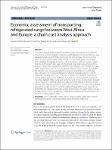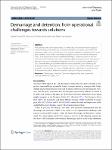Search
Search Results
Determining which ports to call at in a maritime loop is considered as an important determinant factor for shipping companies which impacts not only on efficiency, and productivity but also on transportation costs. The port selection process becomes more challenging and sensitive if the market is for perishable goods such as fruits and vegetables. Specifically, this paper aims to develop an efficient maritime supply chain for reefer cargo. A case study of refrigerated cargo trade between West-Africa and West-Europe is investigated for which the main objective is to minimize the trade route's supply chain costs. To do so, the paper analyzes various scenarios based upon the different types of cargo (transshipment and non-transshipment), commodity types (dry and reefer), and a combinat... |
Reduced free time and increased fees for demurrage and detention create organizational challenges with respect to intermodal transport. As a result, actors within the maritime supply chains are confronted with greater complexity and higher risk of costs; and, therefore, often fall back on transportation by truck to and from the hinterland. That is why the present research examines the impact of this evolution on the bottom line of the involved actors from a maritime supply chain perspective. The research approach consists of reviewing the relevant literature, analyzing the available sector data obtained through interviews and professional experience, and validating the proposed solutions. |


